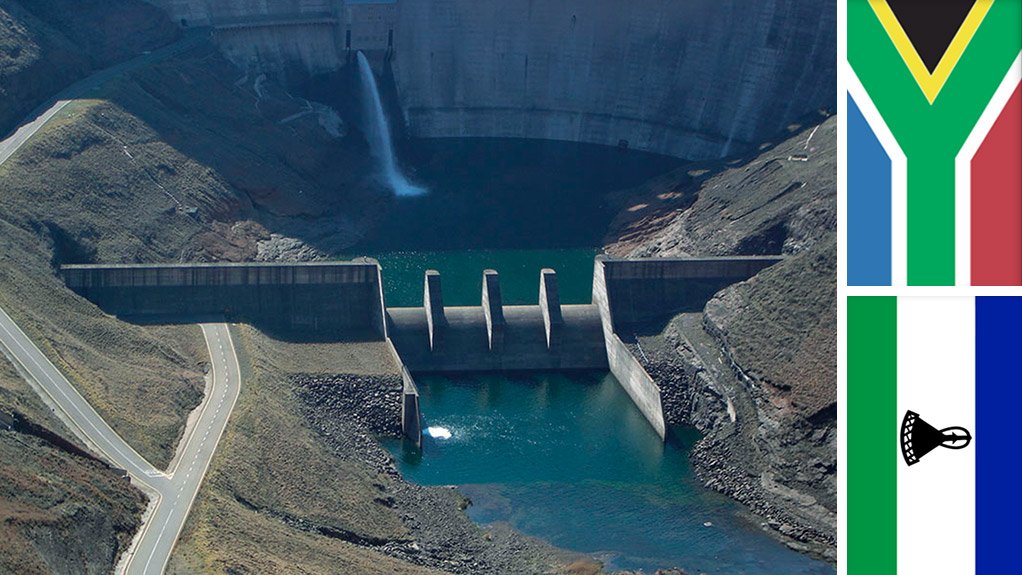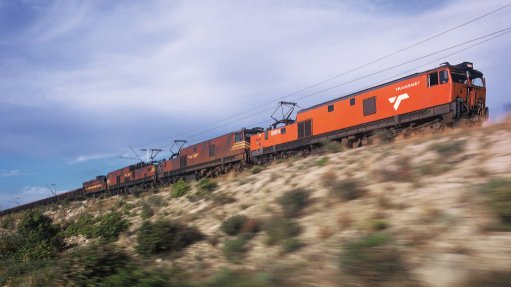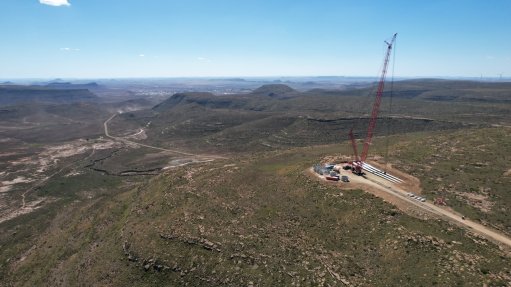Lesotho Highlands Water Project – Phase II, Lesotho and South Africa
Name of the Project
Lesotho Highlands Water Project (LHWP) – Phase II.
Location
Lesotho and South Africa.
Client
The Lesotho Highlands Development Authority (LHDA) and the Trans-Caledon Tunnel Authority (TCTA) are the implementing authorities.
The Lesotho Highlands Water Commission has an oversight function, and represents and advises the two governments, as well as monitors the activities of the LHDA and the TCTA.
Project Description
Phase I of the LHWP was officially completed in 2004.
Phase II of the LHWP will be implemented in terms of two distinct components: a water delivery system to augment the delivery of water to South Africa and a hydropower generation system.
Polihali dam
The Polihali dam will be built downstream of the confluence of the Senqu and Khubelu rivers and will be a 163.5-m-high concrete-faced rockfill embankment dam wall.
The crest length will be 915 m, with a full supply level of 2 075 m above sea level. A 49.5-m-high saddle dam and a side channel spillway will also be built.
Polihali to Katse tunnel
The 38.2-km-long, 5-m-diameter Polihali–Katse dam tunnel will be constructed to transfer water from the Polihali reservoir to the Katse reservoir.
Water will be abstracted from the Polihali reservoir through two separate concrete bell-mouth intakes on the western side of the Polihali reservoir, in the Khubelu river, 3 km upstream of the confluence with the Senqu.
Water will be transferred through the lower and upper intake tunnels to the intake gate shaft. Both tunnels will be constructed using drill-and-blast methods and will be fully concrete-lined. Hydraulic control will be effected by the valves in the intake structures.
The Polihali intake gate shaft will be used only for maintenance and water quality control functions.
Advance infrastructure
Where possible, the existing infrastructure constructed in Phase I will be used. This includes access roads, power supply, telecommunication systems and camps.
Significant additional works contracts will be awarded for the construction of all-weather access roads, a bulk power supply network, telecommunications systems and project housing, as well as labour camps on both ends of the transfer tunnel.
A permanent housing development will be established near the Polihali dam and transfer tunnel, which will consist of project offices, and residential and community facilities.
This will require extensive infrastructure development before the mobilisation of contractors for the two main works contracts of the Polihali dam and transfer tunnel.
The Polihali intake site will use the infrastructure employed to construct the Polihali dam and the transfer tunnel. This includes feeder roads and bridges around the reservoir to connect affected communities, power supply systems, construction camps and communications.
The facilities at Katse dam will be used for the Polihali–Katse tunnel construction. Existing facilities will be used to house consultants and construction management teams. Improvements to the water and sewage treatment plants, clinic and lodge will also be undertaken.
Other infrastructure
In addition to the main access roads to service the construction phase, other access and feeder roads will be built around the reservoir to connect affected communities using pedestrian and light-vehicle bridges, while a pair of major road bridges will be built over the Polihali reservoir, at Tlhakola, crossing the Khubelu river, and near Mokhotlong, crossing the Senqu river.
Environmental measures
Environmental mitigation measures, including environmental flow matters and baseline studies, will be implemented. The full extent is being studied in detail for implementation.
An environmental and social management programme is being implemented to address potential environmental and social impacts associated with Phase II activities.
The programme comprises baseline studies, including those pertaining to environmental flow requirements, and biological and archaeological (including heritage) studies, as well as socioeconomic and public health studies. It also includes environmental- and social-impact assessments (ESIAs), and the implementation of the subsequent environmental and social management and action plans.
Social development programmes
These programmes, mitigation measures, resettlement requirements and baseline studies, as well as public relations and awareness campaigns, will be implemented.
The full extent of these measures is being studied and discussed.
Infrastructure developments might include clinics, feeder roads and bridges around the reservoir to connect affected communities, as well as social development projects such as schools, churches and community halls.
These programmes will be informed by the outcome of the baseline studies, as well as the sustainable development programmes to be designed.
Pumped-storage scheme
The Phase II agreement on the LHWP has determined that the hydropower generation component of Phase II will comprise the Kobong pumped-storage scheme, comprising a hydropower station, the existing Katse reservoir as the lower reservoir and a new upper reservoir in the Kobong valley or any other similar scheme subject to agreement on the outcome of a feasibility study.
The initial technical and economic feasibility studies have recommended that further studies be undertaken. These should include a market study, an integration study, geotechnical investigations, and legal and commercial arrangements. The additional feasibility studies will explore alternative viable hydropower generation schemes that will increase the electricity generation capacity in Lesotho, which will assist in meeting the country’s electricity requirements.
Feasibility studies are under way to determine the way forward.
Jobs To Be Created
Based on what transpired during the implementation of Phase I of the project, more than 3 000 jobs are expected to be created at the height of the construction phase of the main works of Phase II.
Value
As of November 2015, the estimated cost of the Phase II water transfer component was R22.9-billion on completion.
Duration
The development has been materially delayed and completion, initially slated for 2020, is now expected in 2025, based on the current project programme.
Latest Developments
The LHDA has appointed the Matla a Metsi joint venture (JV) to oversee the R445-million design and construction supervision of the Polihali dam, with work expected to start this month.
The JV comprises South African construction companies GIBB and Mott MacDonald Africa, Tractebel Engineering and Coyne et Bellier of France, and Lyma Consulting Engineers of Lesotho.
The scope of services includes reviewing the geotechnical and other project information, the engineering design of the Polihali dam and appurtenant structures, the procurement of construction contracts and supervising the construction on behalf of the client.
Skills development and technology transfer to Lesotho and South African nationals and the training of LHDA staff to operate the dam are also components of the consultancy contract.
Construction on the dam is expected to start in December 2019 or January 2020, with the dam envisaged to be completed in the wet season of 2023.
Key Contracts and Suppliers
To date, several contracts have been awarded for various elements of the advance infrastructure works. These include:
Contract 3004: Professional services for the planning, design and construction supervision of the Polihali western access road.
The LHDA awarded the contract to AECOM SA, together with Lesotho-based subconsultants AECOM Lesotho and RWB Consulting Engineers in August 2016.
Contract 3008: Professional services for the bulk power supply and telecommunications.
The contract was awarded in August 2016 to Plantech-SM Joint Venture (JV).
Contract 3009: Professional services for the planning, design and construction supervision of housing and associated infrastructure.
The contract was awarded in June 2015 to Polihali Infrastructure Consultants – a JV comprising South Africa-based engineering consultancy Mott MacDonald and Lesotho-based Khatleli Tomane Moteane.
Contract 3014: Professional services for the design and construction supervision of the Polihali north-east access road.
The contract was awarded in April 2015 to SMEC-FMA JV, comprising the Bloemfontein branch of international engineering consultancy SMEC and Lesotho-based civil engineering firm FM Associates.
Contract 3015: Professional services for the evaluation, optimisation and site supervision of geotechnical investigations.
The contract was awarded in May 2015 to consultant Jeffares & Green (now called JG Afrika) and Lesotho-based GWC Consulting Engineers.
Contract 3017: Professional Services for the demarcation of the Polihali reservoir.
This entailed the construction of more than 1 300 beacons to mark the 230 km perimeter of the reservoir. The contract was awarded in April 2015 to Lesotho-based consultancy the Maleka, Ntshihlele, Putsoa JV.
Contract 3022: Professional Services for the design and supervision of the Polihali diversion tunnels.
The contract was awarded in October 2016 to Metsi a Senqu-Khubelu Consultants JV.
Contract 4016: Geotechnical investigation works for the Polihali dam and Polihali–Katse Transfer tunnel.
The contract was awarded to geotechnical drilling company Diabor in November 2015.
Contract 6004: Professional services for the environmental and social-impact assessment for the Polihali western access corridor.
The contract was awarded in October 2016 to a JV comprising the Environmental Resources Management (ERM) Southern Africa and Lesotho-based, Sechaba Consultants.
Contract 6008: The public health baseline study.
The contract was awarded to Nonyana Hoohlo and Associates.
Contract LHDA 6010: Professional services for the development of a Phase II safety, environment and quality management framework.
The contract was awarded in October 2016 to Rori Management Consultancy.
Contract 6014: Professional services for the environmental- and social-impact assessment for the Polihali reservoir and associated infrastructure.
The contract was awarded in August 2016 to a JV comprising ERM Southern Africa and Lesotho-based Sechaba Consultants.
Contract LHDA 6015: Professional services for the resettlement planning and implementation: Polihali site establishment and reservoir area.
The contract was awarded to the LIMA Thaha JV in September 2016.
On Budget and on Time?
Water delivery is expected to begin in 2025 based on the current project programme.
It is too early to comment on the hydropower component, as it is being subjected to feasibility studies.
The exact form is still to be determined by ongoing feasibility studies.
Contact Details for Project Information
LHDA responsible manager – divisional manager Phase II Tente Tente, tel +266 222 46000 or email tentet@lhda.org.ls.
LHDA Public Relations Manager Masilo Phakoe, tel +266 62857272 or email phakoem@lhda.org.ls.
Comments
Announcements
What's On
Subscribe to improve your user experience...
Option 1 (equivalent of R125 a month):
Receive a weekly copy of Creamer Media's Engineering News & Mining Weekly magazine
(print copy for those in South Africa and e-magazine for those outside of South Africa)
Receive daily email newsletters
Access to full search results
Access archive of magazine back copies
Access to Projects in Progress
Access to ONE Research Report of your choice in PDF format
Option 2 (equivalent of R375 a month):
All benefits from Option 1
PLUS
Access to Creamer Media's Research Channel Africa for ALL Research Reports, in PDF format, on various industrial and mining sectors
including Electricity; Water; Energy Transition; Hydrogen; Roads, Rail and Ports; Coal; Gold; Platinum; Battery Metals; etc.
Already a subscriber?
Forgotten your password?
Receive weekly copy of Creamer Media's Engineering News & Mining Weekly magazine (print copy for those in South Africa and e-magazine for those outside of South Africa)
➕
Recieve daily email newsletters
➕
Access to full search results
➕
Access archive of magazine back copies
➕
Access to Projects in Progress
➕
Access to ONE Research Report of your choice in PDF format
RESEARCH CHANNEL AFRICA
R4500 (equivalent of R375 a month)
SUBSCRIBEAll benefits from Option 1
➕
Access to Creamer Media's Research Channel Africa for ALL Research Reports on various industrial and mining sectors, in PDF format, including on:
Electricity
➕
Water
➕
Energy Transition
➕
Hydrogen
➕
Roads, Rail and Ports
➕
Coal
➕
Gold
➕
Platinum
➕
Battery Metals
➕
etc.
Receive all benefits from Option 1 or Option 2 delivered to numerous people at your company
➕
Multiple User names and Passwords for simultaneous log-ins
➕
Intranet integration access to all in your organisation





















